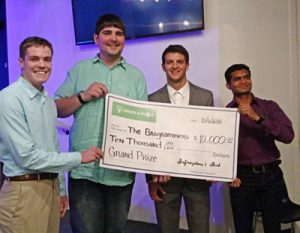Startup Week Chattanooga is a celebration of Chattanooga’s entrepreneurial spirit and the community which it embodies. Because Chattanooga has such a diverse, rich entrepreneurial ecosystem, the annual Startup Week is organized around three tracks- Tech, Social, and Creative. Each track offers a variety of programing options with UTC’s College of Engineering and Computer Science (CECS) keenly involved in the tech track.
One component of the week sponsored by CO. Lab, US Ignite, and the Mozilla Foundation was Launch48 – an entrepreneurship competition. Two CECS students, Forrest Pruitt and Nicole Prebula, co-founders of Viator VR, took top honors and “winnings” of $1,200 cash plus thousands of dollars’ worth of business assistance and donated office space. The students’ award winning project is a foreign language training program using virtual reality equipment to immerse students in a foreign culture. The budding entrepreneurs pitched their winning business plan after a weekend of working to turn their concept into a viable business.

CECS Students also took top honors during the app development component of Startup week. InfoSystems and Skuid presented a $10K scholarship to grand prize winners Alay Patel, Jose Stovall, Steven Hullander, and Evan Grayson, who are all juniors in the Computer Science and Engineering Department. The fifteen teams in the competition were tasked with creating a mobile app that allows consumers to digitally keep track of their physical conditions. The first and second place teams excelled in creating an inviting and intuitive UX/UI design, but the UTC “Brogrammers” took it a step further by adding a mini-game to their app.
Another Startup Week program showcased the research efforts of Dr. Daniel Loveless and his student team. Dr. Loveless, a member of the College’s Electrical Engineering faculty, and his UTChattSat Project were selected to participate in CO.LAB Demo Night. Demo Night presented the work of top entrepreneurs who have positively contributed toward CO.LAB’s efforts over the last year. UTChattSat designs and develops low-cost small-satellite systems for space-infrastructure needs, researches emerging technological problems related to the space sciences and develops 3D-printed satellite models and electronics systems for middle and high school instruction. The satellite technology is currently being used for the development of science and engineering curriculum, research on robust electronics for space systems, high-altitude balloon projects, and general sensor applications. UTChattSat seeks community partners and project-based learning enthusiasts to expand the use of the technology in education and smart city infrastructure.
Leave a Reply